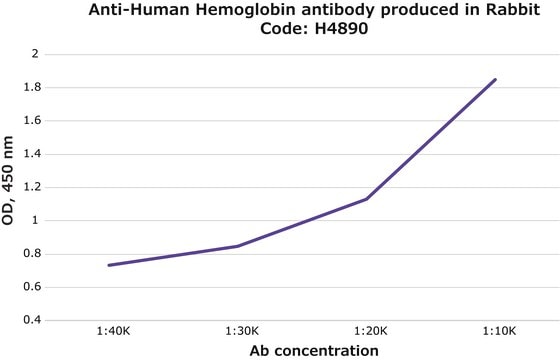46069
Esterase from horse liver
lyophilized, powder, brown, 0.5-1.0 U/mg
Synonym(s):
HLE
Sign Into View Organizational & Contract Pricing
All Photos(1)
About This Item
Recommended Products
form
powder
quality
lyophilized
specific activity
0.5-1.0 U/mg
mol wt
Mr ~70000
color
brown
storage temp.
−20°C
Unit Definition
1 U corresponds to the amount of enzyme which hydrolyzes 1 μmol ethyl butyrate (Cat. No. 19230) per minute at pH 8.0 and 25°C
Other Notes
Sales restrictions may apply
Slightly higher ee′s can often be obtained compared to PLE-catalysis
Signal Word
Danger
Hazard Statements
Precautionary Statements
Hazard Classifications
Resp. Sens. 1
Storage Class Code
11 - Combustible Solids
WGK
WGK 1
Flash Point(F)
Not applicable
Flash Point(C)
Not applicable
Personal Protective Equipment
dust mask type N95 (US), Eyeshields, Gloves
Choose from one of the most recent versions:
Certificates of Analysis (COA)
Lot/Batch Number
Don't see the Right Version?
If you require a particular version, you can look up a specific certificate by the Lot or Batch number.
Already Own This Product?
Find documentation for the products that you have recently purchased in the Document Library.
E. Fouque et al.
Synthesis, 661-661 (1989)
L. Blanco et al.
Tetrahedron Letters, 29, 1915-1915 (1988)
J.E. Guibe et al.
Tetrahedron Letters, 30, 67-67 (1989)
B Sànchez-Nogué et al.
Environmental science and pollution research international, 20(5), 3480-3488 (2012-12-06)
The common sole, Solea solea (Linneus, 1758), and the Senegalese sole, Solea senegalensis (Kaup, 1858), are two important commercial species that coexist in the NW Mediterranean. In order to assess the species' ability to respond to chemical insults, a comparison
Marie C Fortin et al.
Drug metabolism and disposition: the biological fate of chemicals, 41(2), 326-331 (2012-12-12)
Studies on therapeutic drug disposition in humans have shown significant alterations as the result of pregnancy. However, it is not known whether pesticide metabolic capacity changes throughout pregnancy, which could affect exposure of the developing brain. We sought to determine
Our team of scientists has experience in all areas of research including Life Science, Material Science, Chemical Synthesis, Chromatography, Analytical and many others.
Contact Technical Service









